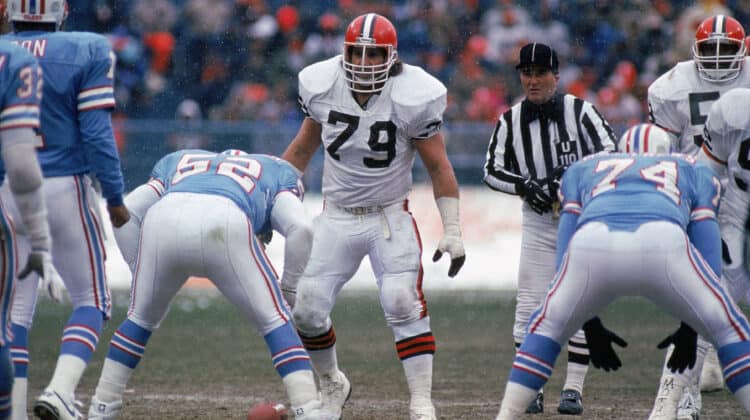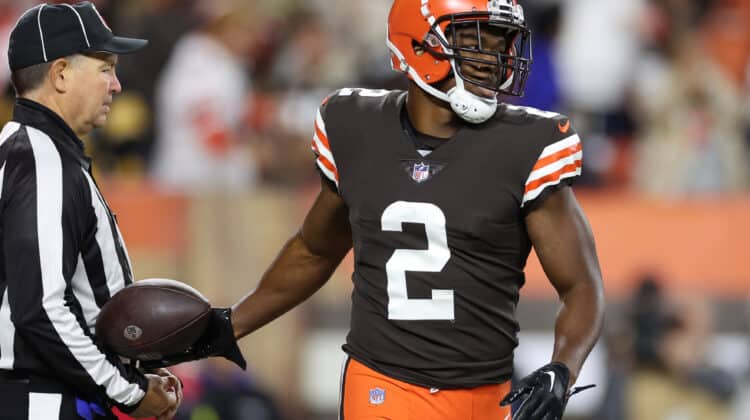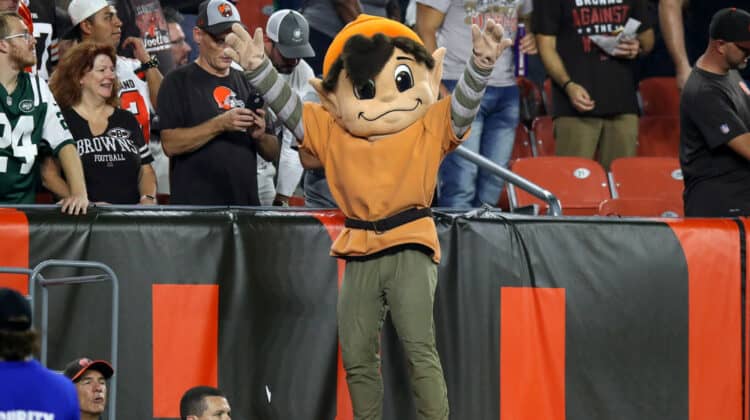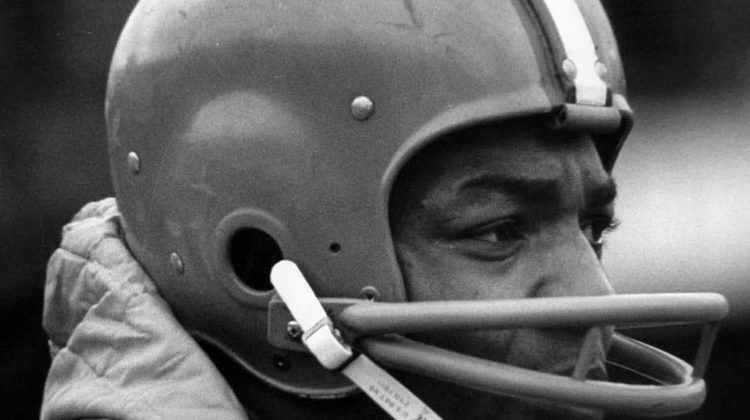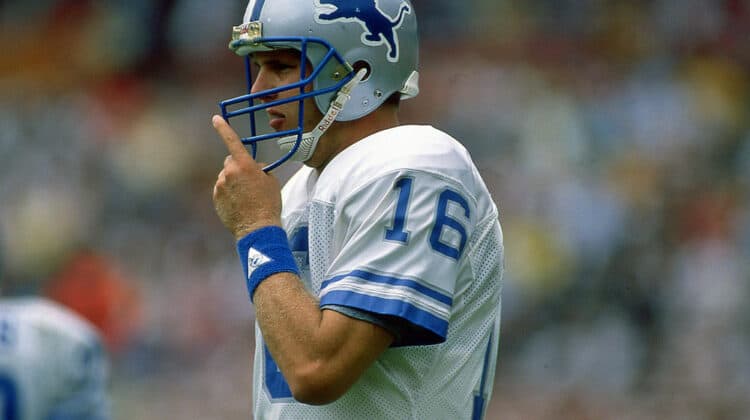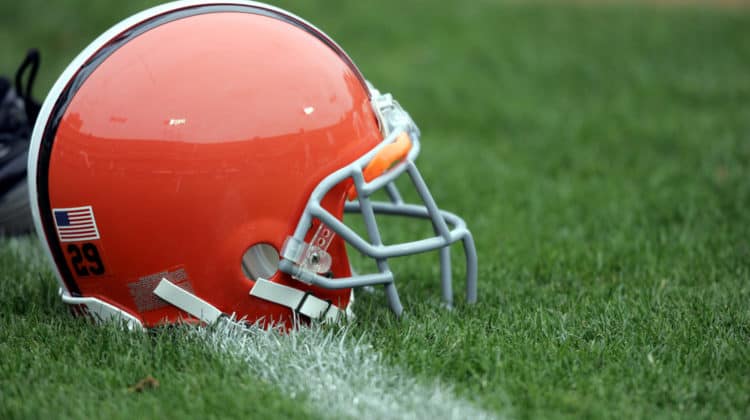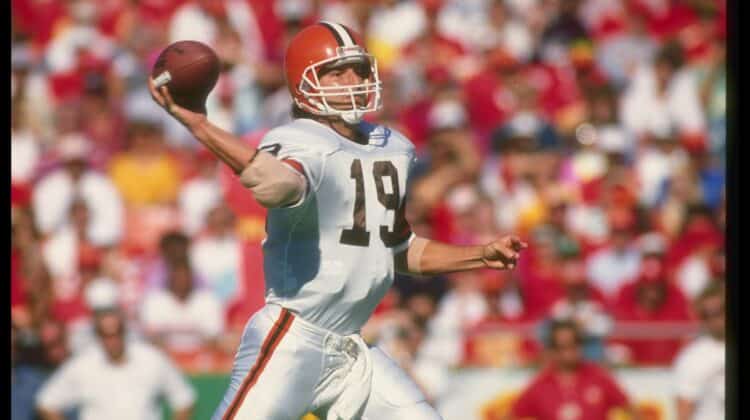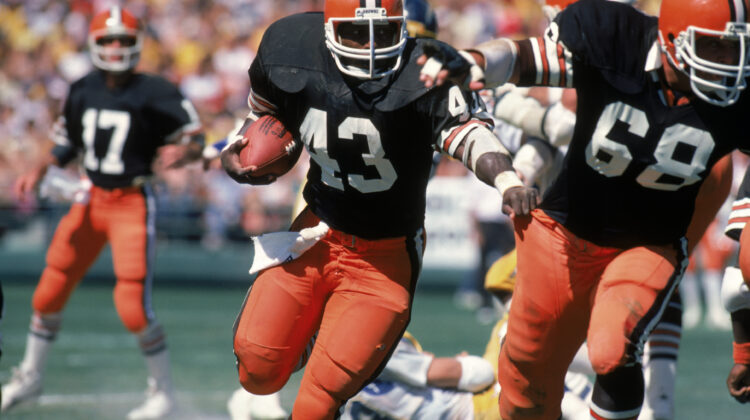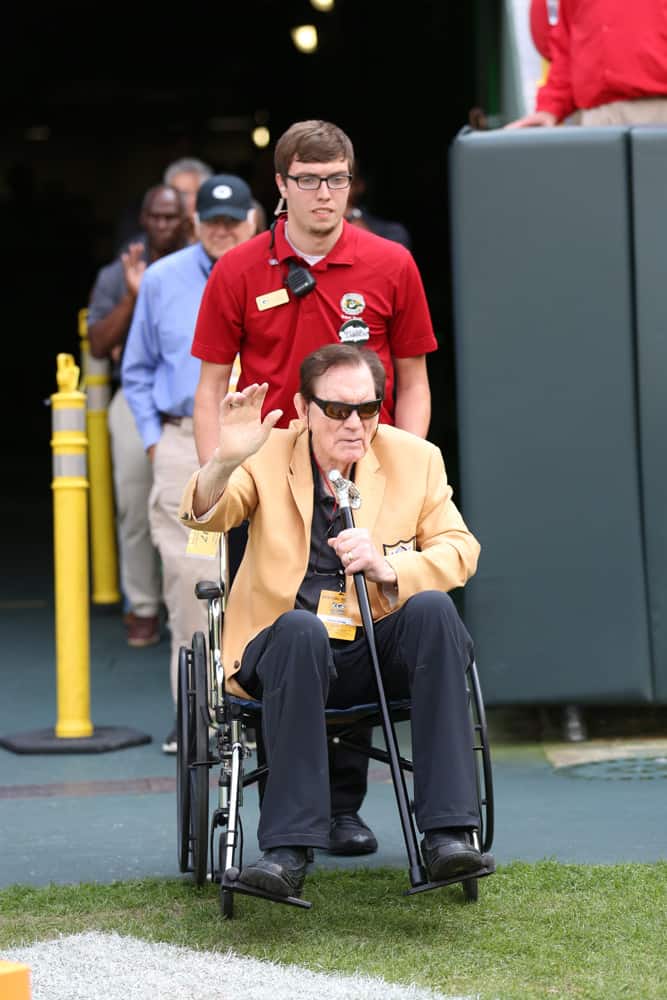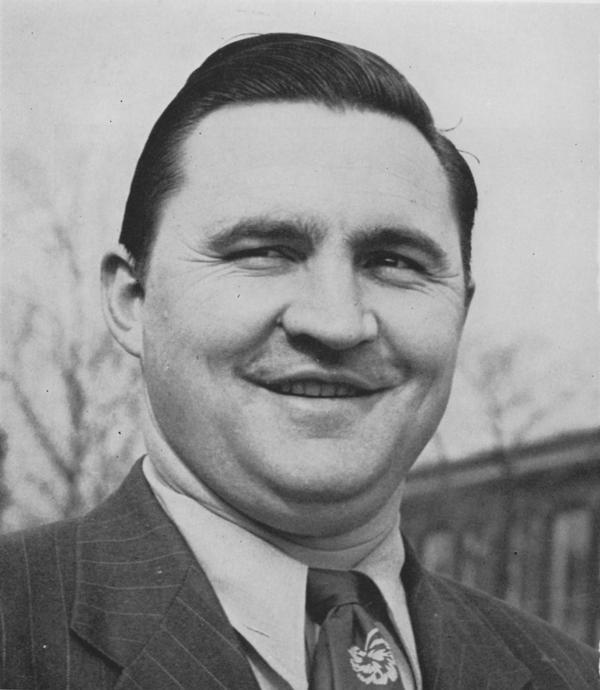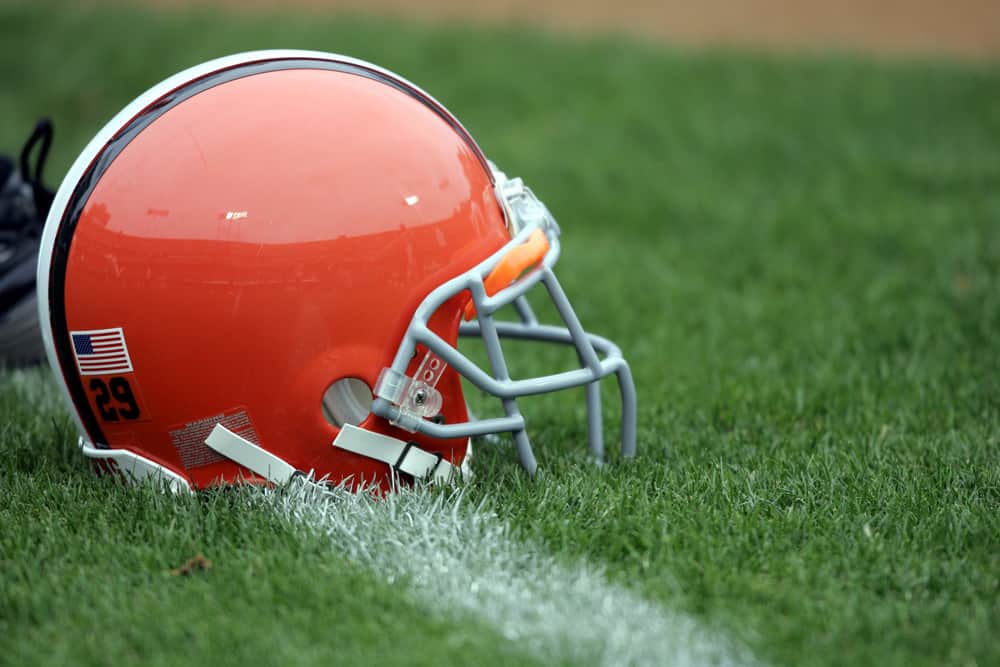
Among the best nicknames of defensive professional football players are Jack “The Assassin” Tatum, Jack “Hacksaw” Reynolds, Chuck “Concrete Charlie” Bednarik, and Fred “The Hammer” Williamson.
Each of these nicknames suggests a tough and physical playing style that we associate with outstanding defensive players.
Another outstanding defensive player whose nickname exemplified his tough and physical playing style was Rich “Tombstone” Jackson.
Over his seven-year professional football career with the Oakland Raiders, Denver Broncos, and Cleveland Browns, Jackson had 45 sacks and earned multiple All-Pro, Pro Bowl, and All-Conference honors.
HOVG Class of 2015: Rich Jackson- DE ('66 #Raiders, '67-72 #Broncos, '72 #Browns)… (5/8) @FootballHistory pic.twitter.com/vxailNEL1N
— Ken Crippen (@KenCrippen) November 2, 2015
We take a look at the life of Rich Jackson – before, during, and after his professional football playing career.
The Early Years Before College
Richard Samuel Jackson was born on July 22, 1941 in New Orleans, Louisiana.
Jackson grew up in the Algiers neighborhood of New Orleans.
His father died when Jackson was four years old.
Jackson was raised by his mother, Katherine.
He attended L.B. Landry High School in New Orleans.
At L.B. Landry High School, Jackson was on both the football and track and field teams.
In football, Jackson played defensive end.
On the track and field team, Jackson ran the 220-yard dash, anchored relay teams, and threw the discus, javelin, and shot.
After graduating from L.B. Landry High School, Jackson headed to Southern University in Baton Rouge, Louisiana for college.
The College Years
Jackson played football at Southern University from 1962 to 1965.
He played outside linebacker on defense, starting as a freshman.
In addition, on offense, Jackson played split end, tight end, and flanker.
Southern posted records in football of 5-5 in 1962, 7-3 in 1963, 4-6 in 1964, and 5-4-1 in 1965.
Jackson excelled in field events at Southern University.
He won the Southwestern Athletic Conference (“SWAC”) championship three times in the shot put and four times in the discus throw.
In 1962, Jackson won the National Association of Intercollegiate Athletics (“NAIA”) championship in the shot put.
Jackson, in 1964, threw the shot put for 58 feet and one inch – a mark which is still the Louisiana collegiate record.
After Southern University, Jackson continued his football career in professional football.
The Pro Football Years
1966-1969
Jackson was not drafted in the 1966 NFL draft.
Instead, he signed as a free agent with the Oakland Raiders in the American Football League (“AFL”).
In 1966, Jackson played in five, but did not start any, regular season games for Oakland.
He played linebacker.
Jackson contributed to the Raiders defense ranking in the 1966 AFL regular season first in fewest total passing and rushing yards allowed (3,910), third in recovered turnovers (40), second in recovered fumbles (17), third in lowest passing completion percentage allowed (45.2%), first in fewest passing yards allowed (2,118), second in fewest passing touchdowns allowed (15), second in lowest average passing yards per passing attempt allowed (6.0), and first in sacks (36).
Oakland had an 8-5-1 record in 1966.
Before the start of the 1967 season, Jackson, guard Dick Tyson, and linebacker Ray Schmautz were traded by the Raiders to the Denver Broncos in exchange for wide receiver Lionel Taylor and offensive lineman Jerry Sturm.
The trade to Denver, and the decision by the Broncos to move Jackson from linebacker to defensive end, marked the key turning point in Jackson’s professional football career.
In 1967, Jackson (playing at a height of six feet and three inches, and at a weight of 255 pounds), at right defensive end, started all 14 regular season games.
On October 8, 1967, Jackson scored a safety, when he tackled Buffalo Bills quarterback Jack Kemp in the end zone, in a 17-16 Denver loss to the Bills.
Jackson had 4.5 sacks in 1967.
The Broncos defense, helped by Jackson’s play, ranked in the 1967 AFL regular season third in recovered turnovers (41) and tied for third in defensive interceptions (28).
Denver posted a 3-11 record in 1967.
Jackson moved positions to left defensive end in 1968.
He started all 14 regular season games in 1968.
In a 21-13 Broncos victory over the New York Jets (who were the eventual Super Bowl champion for the 1968 season) on October 13, 1968, Jackson was credited with seven tackles and five passes defensed.
Jackson’s play contributed to the Denver defense forcing five Jets turnovers.
Jackson had 10.5 sacks in 1968.
For his play in 1968, Jackson was a first-team AFL All-Pro and was invited to the AFL All-Star game.
He also was named first-team All-AFL by the Associated Press.
UPI, and Pro Football Weekly, and second-team All-AFL by the New York Daily News and the Sporting News, in 1968.
In 1968, the Broncos had a 5-9 record.
Jackson started all 14 regular season games at left defensive end in 1969.
On September 21, 1969, Jackson sacked future Pro Football Hall of Fame New York Jets quarterback Joe Namath twice, as the Broncos defeated New York 21-19.
Jackson was named AFL Defensive Player of the week for his play in the game.
After the game, future Pro Football Hall of Fame New York Jets head coach Weeb Ewbank stated:
“That Jackson was too much for us. He is a great end.”
Oakland Raiders tackle Harry Schuh (before an October 12, 1969 game against Denver, which Oakland won 24-14) said about Jackson:
“I’d say he’s one of the best in the league. After watching the films I’ve noticed that Jackson has improved his technique tremendously. Last year he used an illegal club all the time. After a whole game of that I’d have a heck of a headache. And where your head goes, your body goes. . . . Now he mixes up his moves more. He’s developed some finesse to go with his power and speed.”
In describing Jackson’s “Illegal club”, Schuh was referring to Jackson’s use of a pass-rushing technique known as the head slap.
At the snap of the ball, Jackson would slap his blocker on the side of his helmet.
The violent slap would disorient the blocker, throwing him off balance and helping Jackson avoid the block.
Both Jackson (who referred to his head slap as the “halo spinner”) and Pro Football Hall of Fame defensive end Deacon Jones have claimed credit for the creation of the heat slap technique.
While later declared illegal in 1977, the head slap was still considered legal when Jackson played.
On November 2, 1969, Jackson helped the Broncos shut out the San Diego Chargers 13-0.
The Denver defense held San Diego to only 70 total yards (50 rushing yards and 20 “net pass yards”) and recorded six sacks.
In 1969, Jackson had 12.5 sacks.
He also recovered one fumble.
Jackson, for his play in 1969, again was a first-team AFL-All Pro and was invited to the AFL All-Star game.
In addition, in 1969, Jackson was named first-team All-AFL by the Associated Press, UPI, Pro Football Weekly, the New York Daily News, the Sporting News, and the Newspaper Enterprise Association, and second-team All-NFL/AFL by the Pro Football Writers of America and the Newspaper Enterprise Association.
With Jackson at left defensive end, the Broncos defense ranked in the 1969 AFL regular season third in sacks (45).
The Broncos had a 5-8-1 record in 1969.
1970-1972
In 1970, Jackson started all 14 regular season games at left defensive end.
It was his fourth consecutive year to start all of Denver’s 14 regular season games.
Jackson had 10 sacks in 1970 – his third consecutive season of double-digit sacks.
In 1970, for the third consecutive season, Jackson earned first-team All-Pro (now NFL All-Pro, as the AFL had merged into the NFL) honors; he also was invited to the NFL Pro Bowl.
In addition, Jackson, in 1970, was named first-team All-Pro by the Associated Press, the Pro Football Writers of America, and the Newspaper Enterprise Association, and first-team All-Conference by the Associated Press, UPI, Pro Football Weekly, and the Sporting News.
Jackson helped the Broncos defense rank in the 1970 NFL regular season tied for fifth in recovered fumbles (16), second in sacks (50), third in fewest rushing yards allowed (1,351), tied for fourth in fewest rushing touchdowns allowed (7), and fourth in lowest average rushing yards per rushing attempt allowed (3.3).
Denver, in 1970, had another 5-8-1 record.
Jackson started the first seven regular season games in 1971 at left defensive end.
However, in the seventh regular-season game, a 17-16 Broncos loss to the Philadelphia Eagles on October 31, 1971, Jackson suffered a severe knee injury and missed the rest of the 1971 regular season.
When he did play in 1971, Jackson had 3.5 sacks and recovered one fumble.
For his play in 1971, Jackson was named first-team All-Conference by the Sporting News.
Jackson contributed to the Denver defense ranking in the 1971 NFL regular season fifth in recovered fumbles (20), first in lowest passing completion percentage allowed (42.1%), fifth in fewest passing yards allowed (1,985), and first in sacks (44).
Denver had a 4-9-1 record in 1971.
In 1972, Jackson returned to the field and started the first four regular season games for the Broncos at left defensive end.
With Denver in 1972, Jackson had two sacks.
On October 11, 1972, Denver traded Jackson to the Cleveland Browns in exchange for a third-round draft pick in the 1973 NFL draft.
For the remainder of the 1972 season, Jackson played in all 10, and started five, regular season games for the Browns.
He started at left defensive end.
In Jackson’s first game starting for Cleveland, he helped the Browns defeat the Houston Oilers 23-17 on October 22, 1972.
The following week, on October 29, 1972, Jackson started again and helped Cleveland earn a 27-20 victory over Jackson’s former team, the Denver Broncos.
In the next game, on November 5, 1972, with Jackson starting, the Browns shutout the Houston Oilers 20-0.
The following week, on November 13, 1972, Jackson started for the fourth consecutive week, and Cleveland won its fourth consecutive game – 21-17 over the San Diego Chargers on November 13, 1972.
After then being out of the starting lineup for several games, in a 27-24 Browns win over the Cincinnati Bengals on December 9, 1972, Jackson started again.
Over his 10 regular season games with Cleveland in 1972, Jackson had two sacks.
Jackson’s play contributed to the Broncos defense ranking in the 1972 NFL regular season third in sacks (41), fourth in fewest rushing yards allowed (1,668), and tied for fourth in lowest average rushing yards per rushing attempt allowed (3.8), and the Browns defense ranking in the 1972 NFL regular season third in fewest passing yards allowed (1,736) and tied for fifth in sacks (38).
Denver posted a 5-9 record in 1972.
Cleveland compiled a 10-4 record in 1972 (including an 8-2 record after Jackson joined the team and a 5-0 record in games started by Jackson) and earned a “wild card” playoff berth.
In the 1972 NFL playoffs, the Browns met the undefeated Miami Dolphins on December 24, 1972 (in the only playoff game played by Jackson’s teams in his professional football career).
Cleveland lost to Miami 20-14.
Bothered by his knee injury from 1971, 1972 was Jackson’s last season in professional football.
The Years After Professional Football
Jackson married Katherine and had two daughters.
After his retirement from professional football, Jackson returned to his hometown of New Orleans.
Jackson coached, taught health and physical education, and directed a recreation department summer camp.
In 1975, Jackson was inducted into the Colorado Sports Hall of Fame.
Jackson was part of the inaugural class inducted in the Denver Broncos “Ring of Fame” in 1984.
He was inducted into the Greater New Orleans Sports Hall of Fame in 1988.
In 1994, Jackson was inducted into the Louisiana Sports Hall of Fame.
He was inducted into the Black College Football Hall of Fame in 2019.
Jackson also was named to the second team AFL Hall of Fame All-1960s Team.
In reviewing Jackson’s career, one is first struck by the numerous favorable comments made about Jackson’s play.
Pro Football Hall of Fame quarterback Len Dawson stated concerning Jackson:
“When I think of him, I think of pain. I can remember he nailed me and knocked the breath out of me.”
Another Pro Football Hall of Famer, Jackson’s Denver teammate running back Floyd Little, said:
“[Jackson] took pity on nobody. I had to block him at practice – he didn’t care if you were the starting running back, the (heck) with you. . . . The offensive linemen that I know, they feared Rich. You can talk to a lot of the Hall of Fame offensive tackles and they’ll tell you: He was a force to be reckoned with.”
Jackson’s teammate in Denver, defensive end Lyle Alzado (who later played with the Cleveland Browns), stated about Jackson:
“[Jackson] was our enforcer. If a guy was Hollywooding you – you know, trying to show you up – they’d move Richie over to him and he’d straighten the guy out. The Packers had this 6’8” tackle, Bill Hayhoe. I faced him when I was a rookie, and he was grabbing me, jerking me around, making fun of me. I was having a terrible time. Richie said, ‘Lyle, is he Hollywooding you?’ and I said yeah. [Jackson] moved over for one play. That’s all it took. He knocked him to his knees and split his helmet wide open. Remember that famous picture of Y.A. Tittle on his knees, with blood dripping down his nose? That was Hayhoe. They had to help him off the field.”
Another Broncos teammate of Jackson, defensive back Billy Thompson, described Jackson as “[f]erocious . . . [f]erocious and unrelenting”.
Pro Football Hall of Fame Oakland Raiders owner Al Davis (who traded Jackson to Denver) said:
“[Jackson’s] the best player [Denver] ever had.”
Sports Illustrated football writer Paul Zimmerman, in naming Jackson to his “All-Time Team” at defensive end, stated:
“Jackson occupies a special place in my memory because 1) no one ever heard of him, since he was an outlander from one of the AFL’s backwater franchises, and 2) he has never reached any serious level of Hall of Fame consideration, despite my lobbying for him every year in the preliminary balloting, mainly because knee injurires took the heart out of what could have been a glorious career.”
Zimmerman also described Jackson as “one of the most respected DEs in the game” and grouped him with Deacon Jones, describing them as “such great competitors, such great athletic specimens . . . two great players”.
Jackson’s 43 sacks with Denver rank him 10th in Broncos career history.
His total of 45 sacks over his entire professional football career may seem low relative to other outstanding defensive players, but it is important to remember that Jackson’s career was cut short by injury.
As evidenced by the above-described comments about Jackson, it is fair to say both that during his peak years from 1968 to 1970, few players were as feared as Jackson in sacking the quarterback by opposing offenses and that had Jackson not suffered his severe knee injury in 1971 and had a longer career, Jackson would have accumulated many more sacks and be much higher on career sack lists.
Regardless of how one views Jackson’s sack statistics, for Jackson, team performance was more important to him than individual statistics.
When asked if tackling the quarterback was his top thrill in football, Jackson responded:
“No. . . . That would be No. 2. The biggest thrill is winning.”
Another interesting quotation from Jackson concerns his nickname, “Tombstone”.
“People want to know why they call me Tombstone. That’s the termination of life, a symbol of death, the end of the road – how you like that? . . . When I came to line up across somebody, I just had the mentality of ‘search and destroy.’ I would look straight through the linemen at the quarterback, and when I took off, it was just like the guys weren’t there. I had moves to eliminate that person. I prided myself that no one lineman could block me. . . . I would punish you. And if you had to play us twice, the next time around you’re leery, because I knew on film day, you were going to be the focus of attention. The coach was going to keep running the thing back and forth – ‘Look at Jackson beating you up!’”
An outstanding defensive player, over his professional football career, Jackson caused “the end of the road” and served as a “tombstone” for opposing offenses.
Had injury not shortened his career, Rich “Tombstone” Jackson almost certainly would have become broadly recognized as one of the top defensive ends in NFL history and already have been inducted in the Pro Football Hall of Fame.
NEXT: The Life And Career Of Mike Scarry (Complete Story)